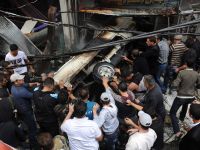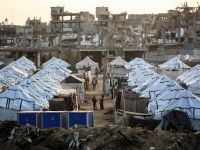Israel disputed Wednesday charges by the UN human rights commissioner that the Jewish state has used excessive force in responding to the two-month-old Palestinian uprising.
On Monday, United Nations Human Rights High Commissioner Mary Robinson denounced the worsening human rights situation in the Palestinian territories and said "every effort" should be made to look into sending in international monitors.
"The civilian population feels besieged by a stronger power prepared to use its superior force against demonstrations and stone throwing by adolescents," she said in a report on the trip handed to UN Secretary General Kofi Annan on Sunday.
An Israeli government statement Wednesday said that the army "is only taking action in response to violence, and is acting in self defense. It is also using great restraint with the aim of avoiding civilian casualties, where possible."
Nearly 300 people have been killed -- mostly Palestinians by Israel gunfire -- since the uprising, or Intifada, broke out on September 28.
The government statement also reiterated Israel's opposition to the deployment of any international force in the territories before there is a peace accord with the Palestinians.
Robinson also said in her report that the building of new settlements should stop and those in heavily populated Palestinian areas should be removed.
She said it was also clear the existence of settlements in highly populated areas is evoking "very serious reaction".
"From a human rights perspective, it seemed to me that this was a seriously aggravating factor that was leading to flashpoints and resulting in the loss of life and permanent disablement of young people, in particular from the occupied territories," she added.
Responding to that, the government said the issue of settlements "will be discussed at the negotiating table.
"Israel demonstrated great willingness to discuss this issue during the Camp David summit, but the Palestinian leadership chose to resort to violence, instead of exhausting the negotiating process." -- JERUSALEM (AFP)
© 2000 Al Bawaba (www.albawaba.com)







